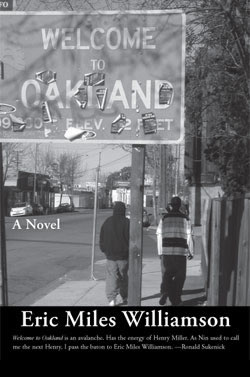Welcome to Oakland

- $29.95 HardcoverISBN: 978-1-933293-79-0
US only, email
for international rates - $15.95 PaperbackISBN: 978-1-933293-80-6
US only, email
for international rates
The sheer energy and passion and intensity, the linguistic virtuosity of Eric Miles Williamson’s latest novel, Welcome to Oakland, will leave readers breathless. The vigor and uncensored redneck honesty of T-Bird Murphy’s blue-collar voice will at turns delight, offend, amuse and enrage readers as T-Bird gives us what we’re not supposed to hear: the groans, gritos and war-whoops of men when they’re not behaving like gentlemen, when they’re out of sight and earshot, when they’re wrapped around their drinks at Dick’s Restaurant and Cocktail Lounge or your local workingman’s watering hole.
In Welcome to Oakland, the T-Bird Murphy of Williamson’s internationally acclaimed novel, East Bay Grease, is now a man. He’s been divorced twice, and he finds himself hiding out in a garage in rural Missouri for a reason we’re never told, confused and stunned, shell-shocked by the hand life has dealt him. He opens his story, “I’m always happiest when I live in a dump, and I’ve lived in some serious shitholes,” but it’s difficult to believe him. What unfolds is the story of a workingman who tries his hardest to escape the hell of the Oakland ghetto, who finds honor in squalor, kinship among the broken divorcees of Dick’s Restaurant and Cocktail Lounge, dignity and beauty at the garbage dumps where he sleeps in the cab of the scow he drives for a living.
What They’re Saying About Welcome to Oakland
“Some readers will be inclined to fling Welcome to Oakland into the nearest grease pit. This would probably come as no surprise to the author, but ignoring Williamson would be a mistake. For those who can stomach this mad sprint through the Oakland of T-Bird Murphy, there emerges a powerful portrait of a man both extolling and exorcising the demons of life among the working poor. We should listen well, and not judge that voice by the standards of polite discourse, but simply hear it and feel it as the mournful echo of a lone — and lonely — trumpet.”
—David Masiel, The Washington Post
“…this powerful slice of greasy, grimy life is highly recommended, especially for those living in urban areas.”
—Library Journal
“…the novel’s greatest strength comes from the fact that no matter how low these men find themselves they can still create beauty out of their world. Whether it’s the Australian watchman of the Oakland dump who spends his spare time sculpting cities of garbage, or a parade of garbage scows carrying a wedding party, or a toothless trumpet player belting notes into the night, or a young T-Bird elevating revenge into an art form, Welcome to Oakland shows us the beauty people make out of the mundane moments and objects found around them.”
—Front Porch Journal
“Eric Miles Williamson is the mystic on the street corner, the one who promises his listeners better days to come. Only those locked into their daily cyclic movements will continue walking past his street corner. And those of us who will listen will be fulfilled because we’ll already be drawn in by Williamson’s fierce bravery to step away from conventional storytelling in order to release the wild beast contained in the narrative of Welcome to Oakland.”
—Tony R. Rodriguez, East Bay Literary Examiner
“…an angry, frustrating, smart, and sometimes beautiful mess of a book about a mess of people in a mess of a town.”—Sean Bernard, Small Press Reviews
“Prepare yourself: reading Welcome to Oakland is liking drinking Everclear with a chaser of Drano.”
—Popmatters
“Welcome to Oakland is a scathing indictment of most of what we like to think we know about class. It is also one hell of a raucous good time, right up to its surprisingly tender – and wonderfully well-earned – ending.”—InDenver Times
“Welcome to Oakland is an avalanche. Has the energy of Henry Miller. As Nin used to call me the next Henry, I pass the baton to Eric Miles Williamson.”
—Ronald Sukenick
Against the backdrop of a literature that seems to have run out of ideas, Eric Miles Williamson has given us a truly new thing, Oakland: utterly reckless and free-wheeling, Beat and beaten-down, musical and nasty, rude and muscular, drunken and exalted all at once. From his stunning novel, East Bay Grease, about his childhood among Hells Angels, to Two-Up, about the dangerous life of construction work, to Oakland, Jack London, and Me, his take-no-prisoners apologia pro vita sua, and now Welcome to Oakland, Williamson has been seizing the low ground and etching his name on it with a broken piece of rebar: a quadrant of American turf along the San Francisco Bay whose beating heart is a place called Dick’s Restaurant and Cocktail Lounge in Oakland. Welcome to Oakland is like nothing else in American writing at the moment: maybe ever. It is Jack London in a clown’s outfit, mud-flat comedy among the garbage heaps and the refineries, rage against the machine unless it is a motorcycle, fury against the well-off and the ex-wives, the whole Bukowskian effluvium held together by music, the great blaring trumpet of living itself.
—Mark Shechner, author of Up Society’s Ass, Copper
“Fuse the brains of Henry Miller and Louis-Ferdinand Celine, place within the skull of a contemporary American novelist, and set this person to work. The result would be Eric Miles Williamson’s Welcome to Oakland. Oakland, Williamson’s Oakland, anyway, is sordid and awful, but also honorable and real. Similarly, the characters in his huge cast are both splendidly oversized and entirely human and sympathetic. A roller coaster of a book that leaves you standing on life’s solid ground.”
—Jake Fuchs
“There’s books you can’t put down, sure, but every great once in a while there’s a book like this, a book that grabs you by the face and makes you stare deeper into it than you really want, so that you never forget. Get ready to be intimidated, insulted, and amazed, sometimes all in the same sentence.”
—Stephen Graham Jones
“When I hear politicians talk about how much they love ‘blue collar America’ I always wonder if they’ve read Eric Miles Williamson. In Welcome to OaklandWilliamson gives us his own hard-earned, unforgettable riff on “blue collar” America, one that sounds like early Henry Miller or war-ravaged Celine—not a sound bite from the RNC. He uses profanity the way Max Roach used the high hat. He writes about garbage the way Wallace Stegner wrote about trees and offers observations on marriage that very few senators would appreciate. It’s a world whose humor and rough beauty Sarah Palin seems to have missed, but thanks to Williamson, we’ve got a front row seat.”
—Whitney Terrell

 14 Fictional Positions
14 Fictional Positions